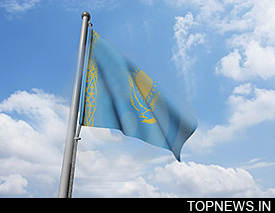Kazakhstan, Eurasia take heart from G-20 measures to control global meltdown
 New Delhi, Apr. 4: Economic experts are of the unanimous view that access to investments, new technologies, knowledge, goods, services and interaction with transnational companies exert a positive influence on any country''s development, but at the same time, acknowledge that such advantages are not necessarily available to all.
New Delhi, Apr. 4: Economic experts are of the unanimous view that access to investments, new technologies, knowledge, goods, services and interaction with transnational companies exert a positive influence on any country''s development, but at the same time, acknowledge that such advantages are not necessarily available to all.
While not all countries are faced with the problem of survival, a majority in the new millennium is facing the negative consequences of globalization, and therefore in this context, it is heartening for a developing country like Kazakhstan, and Eurasia overall to note that leaders of the world''s largest economies have pledged to pool in an additional 1.1 trillion dollars in resources for the International Monetary Fund and other multilateral institutions to boost growth and neutralize the ongoing global meltdown.
This agreement at the second Group of Twenty (G-20) Summit is being projected as the biggest stimulus package in global history, besides being the biggest infusion of resources into multilateral institutions.
G-20 leaders appear to have paid heed to key recommendations of the Second Astana Economic Forum held last month with a focus on how to ensure the economic security of Eurasia in a system currently fraught with unimaginable and unwanted global risks.
That the G-20 have agreed to treble IMF resources to 750 billion dollars and support the allocation of new Special Drawing Rights of 250 billion dollars, besides supporting at least 100 billion dollars in lending by multilateral development banks and ensuring 250 billion dollars in trade finance, should please Kazakhstan President Nursultan Nazarbayev, who has repeatedly voiced the need for reforming the world financial system.
Last month, Nazarbayev used the platform of the Second Astana Economic Forum to put forward three proposals viz. search for a new paradigm corresponding to the needs and challenges of the 21st century; bending the global financial system to serve the basic interests, goals and values of its key participants and finally to transform currency and financial instruments to solve the global financial crisis.
He suggested the requirement for a universally recognized juridical base for world currency circulation, saying that the procedure at present is undemocratic and non-competitive. The market he said then was obliged to observe ''somebody else''s'' game rules".
Nazarbayev said there is a necessity to adopt a general law on world currency by most countries under UN approval.
He said: "any privileges for separate world currency issuers must be strictly prohibited, adding that such a system could be the basis for the world''s first legal and legitimate world currency.
He expressed the hope that the issue of a world currency will be included in all for a, including the G-8 and the G-20.
In June last year, the Association "Eurasian Economic Club of Scientists" (AEECS) was set up with Nazarbayev as its honorary president. Its main aim was to integrate the efforts of the scientist-economists, experts, and community leaders to solve economic growth issues, support economic and social progress of the world community, promote conditions for a comprehensive sharing of ideas, experience and skills at both the micro and macro levels.
Among the other participants were UN Deputy Secretary-General and Executive Secretary of the United Nations Economic Commission for Europe (UNECE) Jan Kubish, Nobel Prize winners in economics Edmund S. Phelps and Robert Mundell, the president of the Islamic Development Bank, Dr. Ahmad Mohammad Ali Al Madani, and the Former European Bank for Reconstruction and Development president Jean Lemierre.
The main partners of the forum were: the UNECE, the United Nations Industrial Development Organization (UNIDO), the World Bank, the Islamic Development Bank, the Asian Development Bank, the US Agency for International Development (USAID), the Central Asia Regional Economic Cooperation (CAREC), the World Innovation Foundation, and the International Programme Evaluation Network (IPEN).
In anticipation of the deliberations that were taken up at this month''s G-20 summit, the Astana Forum discussed the following:
- The Global Economic Crisis and its Influence on the Economic Security of Countries.
- The State Regulation of the Economy in the Conditions of Global Challenges.
- Development of the Public and Private Partnership in the Conditions of Global Challenges.
- Development of the Entrepreneurship in Conditions of Global Risks and.
- Development of the Islamic Economy in Conditions of Globalisation.
Simultaneously, other topical world economy issues were taken up by the speakers and participants.
The participants had developed recommendations of the II Astana Economic Forum for the G-20 Heads of States "The crisis lessons: a radical reversion of economic paradigm".
The forum was covered by about 250 local and international media representatives.
Dr. Ahmad Mohammad Ali Al Madani and UN Deputy Secretary General Jan Kubish both said that the Second Astana Economic Forum had made an important contribution to the international discussion on the impact of the global economic crisis.
Nobel Laureates in Economics Mundell and Phelps said they agreed with President Nazarbayev''s views on the need for a credible world currency that reduces dependence on external negative factors.
It was decided that the Third Astana Economic Forum would take place between July 5 and 7, 2010 in Astana. (ANI)